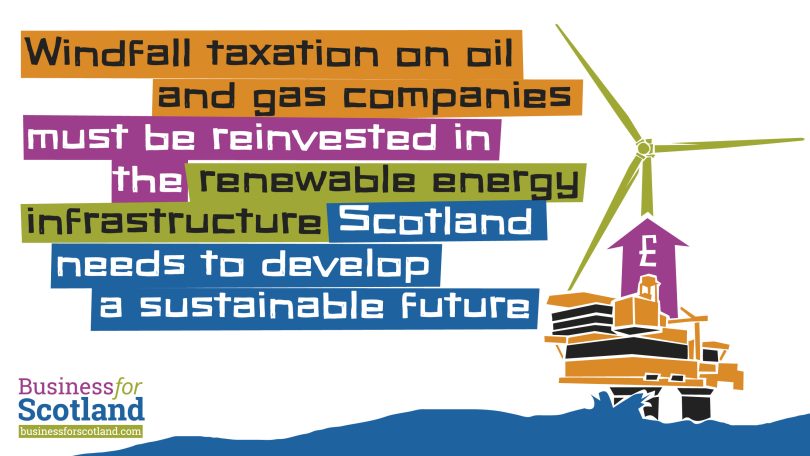Many Scots are angry that the profits from the exploitation of Scotland’s oil for the last 50 years have gone south. There is little to show for the oil boom in Aberdeen and other areas where they were extracted.
For years Business for Scotland has argued that the oil and gas companies who exploit this finite natural resource and make massive profits should be taxed more heavily and more effectively.
More money should be raised for the public purse – but that money has to be reinvested in the renewables infrastructure that Scotland so desperately needs. It should not be taken down to London and squandered.
Now the SNP has announced that they agree. In an independent Scotland, taxes on the fossil fuel sector will be reinvested to help Scotland to take advantage of the opportunity to be a renewables powerhouse.
That investment is desperately needed – Scotland is already falling behind – huge sums are being spent in the USA and Europe on the green industrial revolution, yet the UK has offered only paltry amounts. Unless this changes, Scotland is walking into an energy disaster where energy prices will remain amongst the highest in the world, economic growth will be blighted and Scotland will let our second “once-in-a-lifetime opportunity” slip away – we won’t get a third.
Labour has U turned, again – now proposing to take more from Scotland and invest less
The Labour Party has gone from promising to spend £28 billion a year in investment in the UK’s green transition – what experts say is the minimum required – to offering a fraction of that. At the same time as dropping their investment pledge they announced new tax plans for the North East.
Labour has announced a whopping new tax on the oil and gas sector – but none of that money is guaranteed to come back to the North East in the form of investment. Instead it will be spent by London on London’s priorities – which include costly and wasteful nuclear power plants.
Many businesses in the North East are rightly angry about this U-turn and have made their feelings known. It is terrible news for Scotland – Labour’s much-touted public partnership seed fund to be called “Great British Energy” is a tiny investment by comparison.
It was Labour that decided against a Sovereign Wealth Fund
Since the 1970s more than £300 billion has flowed to the Treasury in oil and gas taxation from oil reserves in the North East of Scotland. Labour was in power at the start of the oil boom and they briefly considered starting a sovereign wealth fund – but decided against it. (Believe in Scotland has modelled what an independent Scotland’s economy would look like).
Now the Labour Party wants to take more money out of the area – and use it to plug the massive financial holes in plans to build new nuclear power plants in England. Most experts say these will deliver electricity that costs many times more than what wind, solar or hydro can provide.
Worst of all, these policies promise to kill Scotland’s chances of developing the industrial base and infrastructure it would need to be a world leader in renewables.
Scotland has had NO say in how oil and gas was taxed or regulated
Oil and gas fields in Scotland account for the vast majority of UK oil and gas production, but the oil industry and all taxation and business policy relating to it are powers reserved to Westminster. Scotland and Holyrood have been powerless to influence the way this was managed.
The UK government has chosen to tax oil and gas in a unique and eccentric way, allowing the industry breaks that often don’t make sense. For instance, oil giant Shell produces about 120,000 barrels of oil a day equivalent in the UK, almost all from Scottish waters. Yet because of the UK tax system it made zero taxable profit in the UK for five years, from 2017 to 2022. Of course that had an impact on the apparent state of Scotland’s economy.
A comparison with Norway
From the oil price fall in 2015 to 2021, Norway generated almost £100bn in oil and gas sector revenues compared to £5.6bn by the UK – despite producing a similar amount. This means that Norway’s revenues from oil and gas in this time period were 17 times higher than the UK’s.
Think about that – the government of Norway, a small independent nation with 5.4 million population, is 17 times better than the UK Government at generating revenues from oil and gas when both countries have produced roughly the same amount of oil since 1975.
Very little oil money has ever come back to the North East of Scotland to be invested – only paltry sums. Robert Gordon University calculated at least £17 billion was needed as a basic investment in Aberdeen for it to become a significant renewables player. Yet the UK government has not even put any actual money into the region.
Fool me once
Scotland helped elect the Labour government of the 1970s that decided against a windfall tax. Since then successive Westminster governments have taken sole responsibility for taxing and managing Scotland’s fossil fuel resources. The Scottish people and Parliament have had no say over that.
Most of those million-year-old fossil fuels have been extracted and burned in the course of a human lifespan. This bonanza generated huge profits – yet there is nothing to show for that in Aberdeen and the North East.
Scotland has a different opportunity now – to build up a renewable-based infrastructure that can power the electricity-hungry economy of the future. But to do that it needs investment. Labour and the Conservatives promise little on that front.
Business for Scotland welcomes the SNP’s alignment with the proposal to use tax revenues generated from the remaining fossil fuels to build a better future for Scotland.








